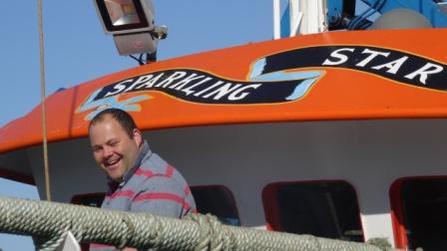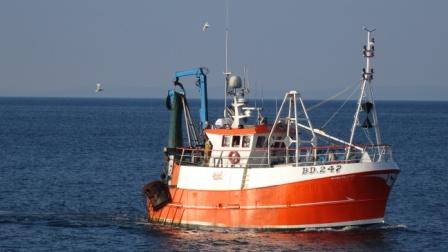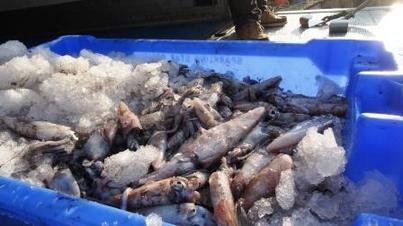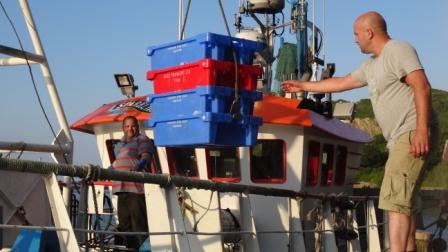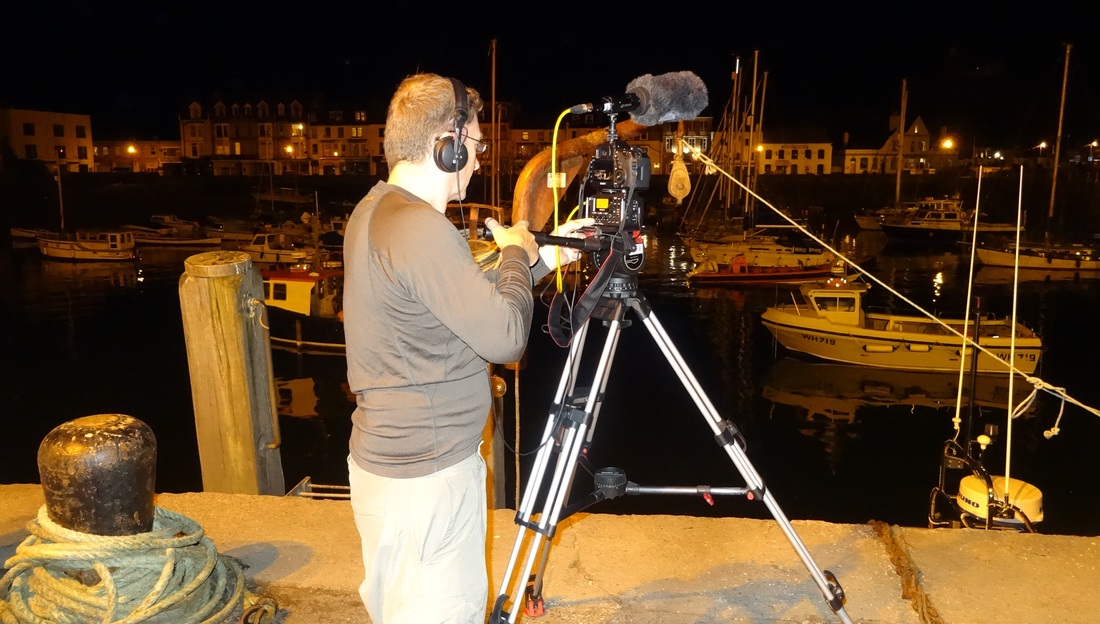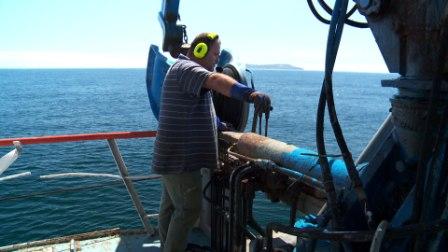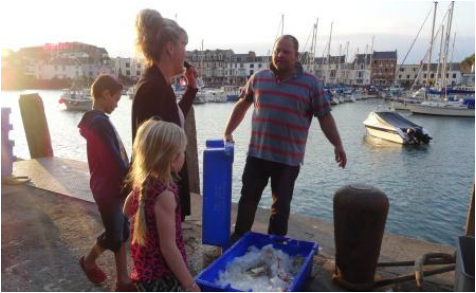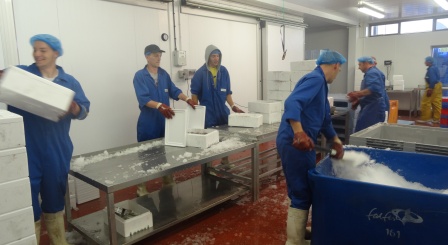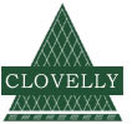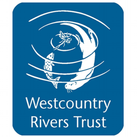FISHING FOR THE LONG HAUL?
with Paul Stone & the crew of the Sparkling Star
Summer 2015 & Sparkling Star is back fishing from Ilfracombe harbour as is her sister ship Our Olivia Belle & other boats from S&P fish shop. And S&P fish shop and café right on the harbour is open - see our fish page.
Filmed & edited by Mark Brindle (Maniac Films). Music by Rowan Lincoln-Gordon. Directed & produced by Jo Stewart-Smith
BEHIND THE SCENES :
“Perhaps we could be
your deep sea film boat, Jo?” Paul Stone, skipper of the Sparkling Star (and
star of our film) asked me last week, “it’s either that or stacking supermarket
shelves at Tescos – if this carries on.”
As usual, Paul said it for a laugh, just seconds after he’d told me the
ban on fishing ray in the Bristol Channel “was a big, big shock, overnight,
bang!” He said ‘bang’ with the same intonation his grandfather used, when he
told me he’d nearly drowned out salmon netting – reminding me of the skills and
knowledge that generations of North Devon fishermen have passed down from
father to son.
|
After
several months of talking to Paul on his mobile, somewhere out in the Bristol
Channel, I finally met him in Ilfracombe harbour unloading his catch. The first
thing I noticed was how patient he was with onlookers, including several
children, happily showing them the fish. Second was how he looked out for his
crew. Finally, although keen to get back to his family, Paul spoke patiently to
me. This film has been my biggest learning curve and the biggest roller coaster
ride. It’s the film where the story has
changed most often – in fact almost every time I speak to Paul he’s facing some
new obstacle, whether it’s the tail end of a hurricane, a change in the quota
or price, something which needs fixing on the boat or a ban on one of ‘our
money fish’. Yet through it all Paul has remained relentlessly cheerful and
good humoured, with plenty of quips to keep everyone’s spirits up and optimism
that next week the fishing will be better. And ironically it’s rarely the
fishing itself which is a problem – even the weather has been pretty kind this
year.
|
A ROLLER COASTER RIDE
I began pestering Paul through a winter, lashed by storms, as Tom Leather, first mate says ‘the worst winter I can ever remember.’ Sparkling Star was out there trying to fish although the sandbanks ‘have been churned up like a washing machine,’ yet Paul told me how tough it was for all the other boats who’d lost gear and had it far worse. Then on the 31st March, Sparkling Star (a 15 metre twin rig otter trawler) steamed over to North Cornwall ready for the ‘Trevose Box’ to open. The box is a 3,600 square mile area of seabed which fishermen agreed to close for a few months each year to allow cod, whiting and flatfish such as Dover Sole to spawn and grow. A few days later he reported, “we’re nestled quietly here, next to our sister ship, Our Olivia Belle, the only two boats from North Devon. And the fishing is good –the best hauls I’ve had in thirty years!” Fantastic news after the wild winter. “But there’s a crazy number of boats out here,” Paul warned, “it could be game over very quickly and all that good work will be lost.” Scott Wharton, co-owner of S&P fisheries had warned me to watch on Marine Traffic as the ‘Trevose box’ opened. I clicked on the page and it was as if someone had scattered brightly coloured smarties over the patch of sea between the North Cornish coast and Ireland. Paul said “there are about 30 trawlers south of us from all over, mostly European" many up to 30 metres in length and a 1000HP- all fishing legally under the Common Fisheries Policy.
I began pestering Paul through a winter, lashed by storms, as Tom Leather, first mate says ‘the worst winter I can ever remember.’ Sparkling Star was out there trying to fish although the sandbanks ‘have been churned up like a washing machine,’ yet Paul told me how tough it was for all the other boats who’d lost gear and had it far worse. Then on the 31st March, Sparkling Star (a 15 metre twin rig otter trawler) steamed over to North Cornwall ready for the ‘Trevose Box’ to open. The box is a 3,600 square mile area of seabed which fishermen agreed to close for a few months each year to allow cod, whiting and flatfish such as Dover Sole to spawn and grow. A few days later he reported, “we’re nestled quietly here, next to our sister ship, Our Olivia Belle, the only two boats from North Devon. And the fishing is good –the best hauls I’ve had in thirty years!” Fantastic news after the wild winter. “But there’s a crazy number of boats out here,” Paul warned, “it could be game over very quickly and all that good work will be lost.” Scott Wharton, co-owner of S&P fisheries had warned me to watch on Marine Traffic as the ‘Trevose box’ opened. I clicked on the page and it was as if someone had scattered brightly coloured smarties over the patch of sea between the North Cornish coast and Ireland. Paul said “there are about 30 trawlers south of us from all over, mostly European" many up to 30 metres in length and a 1000HP- all fishing legally under the Common Fisheries Policy.
|
With the Trevose Box spent, Sparkling Star turned its
attention back to targeting the ray, the fish that as Paul says ‘most of the
North Devon trawlermen built their livings on’ (see the Ray Box & sustainable fishing page).
I wanted to make a film on the ray story, but for various reasons it wasn’t possible and over months of trying to meet Paul, in harbour, I realised how unpredictable a trawlerman’s life is. Scott Wharton, generously offered access to film S&P trawlers, but warned, “you’ll have to be prepared to be away 3 to 6 days, even a week – the boat can’t afford to come in until it has fish to land.” I love the sea and a week on the ocean sounded enticing, but I soon learned it was nothing like booking a week’s holiday in your diary! Paul calls each day – depending on the weather – the swell – the fish – which is difficult when you’re trying to book a film crew. |
|
June came round and Paul told me the squid would begin to
bloom off the North Devon Coast. “You can pretty much set your watch to the
date - around the last week in June.” As
a family we love eating squid. It’s easy to cook, incredibly versatile and yet
other than a few pubs and specialist restaurants like Fat Belly Fred’s, or
SeaDog who sell ‘world inspired seafood streetfood’, fresh squid rarely
features on local menus. So I was genuinely surprised to find that squid is the
second most important catch to the North Devon trawlers. And flabbergasted to
learn that an incredible 99% of this local squid catch is shipped off to the
Mediterranean –where they love it! It
looked like a great story (see following the squid trail.) One big advantage
for our film crew is that squid are so delicate –they’re put on ice within half
an hour and landed every couple of days. And happily in Mark Brindle from
Maniac Films, I found an easy-going, sea-loving cameraman prepared to join the
trawler for two days and be called up at short notice!
For about a month – filming looked like being on then off – as the crew landed squid at short notice, turning the boat around within an hour, pushing themselves to the point of exhaustion to make the most of the short season, with barely a day off. |
|
The crew was down to three, Paul, Tom
Leather (first mate and relief skipper) and Logan Suddick. When a member of the
crew left the boat they made a joint decision not to replace him, in order to
earn a bit more to make up for the harsh winter. Fishermen earn a share of
catch – after money is taken off to pay running expenses -
for Sparkling Star around £800 a day. Another thing I learned was
that fishermen can risk their lives, working in tough conditions, seven days a
week, catch fish and still come home with nothing. Then suddenly, generously, Paul, knowing he was landing fish
to his processor the following evening, agreed to forgo sleep to come to
Ilfracombe to collect Mark – providing we were prepared to jump on board at 2
am in the morning. They can only catch squid in daylight, the squid grounds are
around two hours away and to make a living they needed to be fishing from dawn
to dusk.
|
|
Out on the water, in the July sunshine, catching good hauls
of squid, the crew were upbeat – as they are at the beginning of our film.
There’s amazing camaraderie and team work on the boat –as Logan says “it’s like
we’re family”. There’s frantic business when the nets are coming up and the
fish needs sorting and gutting – interspersed with long waits when the trawl is
down or they’re on the move and they try and snatch a few hours sleep, watch
films, use their mobiles if they can get signal, rib each other or answer our
questions! Paul rarely takes a break, constantly checking on the gear, or his team, offering tea or coffee and doing
most of the cooking! Logan now 20, discovered fishing through work experience,
straight from school in Brixham. He’s been on several different boats, some of
them ‘a bit rough’ –and told me he was sticking with Paul from now on. Tom, aged 28, has amazingly, been with Paul
since he was 11. “I grew up in Bideford and set my heart on fishing. I don’t know
anything else.”
|
As they fished, there was another family about two miles
away, Paul’s father and uncle, Peter and Stephen Taylor, skippering the
Bideford based trawlers: Hannah Louise and Anna Marie. “A healthy bit of competition,” Paul said
laughing. But the real rivalry is between Paul and Marcus White, known by
everyone as “Tats”, skipper of the Olivia Belle, another S&P trawler. They keep in touch and look out for each
other on the water, but they don’t always reveal where the best fish are! I met
Tats and his crew, a few times, in harbour, and he told me the buzz for him was
setting a target and wanting to be the best each month. Paul, like the other fishermen I met has huge
respect for Tats, who’s fished out of Ilfracombe for 22 years. “He’s a good
fisherman,” Paul told me, “lives in his welly boots”. When I met Tats he was
looking forward to finding the squid ‘first.’ I had hoped we’d film the Olivia
Belle from Sparkling Star but she’d “gone off nosing around for some
bass.”
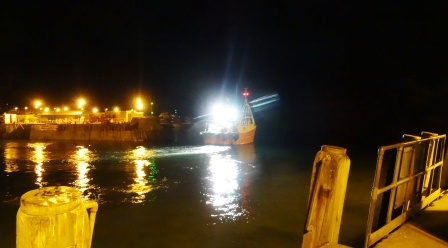 the crew heading out again 'tired but happy'
the crew heading out again 'tired but happy'
As the fishermen said, squid like it hot and humid and it
was a glorious hot summer. However the crew are below deck most of the time,
whether sorting and preparing the fish or trying to snatch some sleep. Mark
struggled in the heat, finding it almost unbearably sticky and exhausting.
After 24 hours (again in the middle of the night) he staggered off the boat
with total respect for the fishermen. “I don’t know how they do it!” We met
Tats and his crew in harbour at 3am that same morning – changing their gear
back for squid fishing. That’s another thing I learned, if the quota is spent
or the fish gone – you can’t just switch to target another fish – you need to
buy quota and you need to invest in the right gear. Once again Sparkling Star,
having dropped off fish and cameraman turned straight around and headed back
out to sea. That night we left our crew tired but happy, after what turned out
to be one of the best hauls of squid this year. We’d planned to follow the
trail of the squid, but if you’ve watched the film you’ll know already that we
stayed with the fishermen rather than follow the fish. Based on what I’d heard
on the boat, as a filmmaker, I freely admit, I was by now, far more interested
in the crew and their story.
|
Paul was hopeful that the bountiful squid would take them
through to early September, but in early August, the tail end of hurricane
Bertha struck UK waters. Knowing how hard the fishermen were pushing
themselves, I watched all the North Devon trawlers anxiously, hoping they
wouldn’t leave it too late to make it safely back to port. And when they made
it (all our crew have families they rarely see) I thought at least they will
get one well deserved week off in the school holidays. As usual, Sparkling Star
was the first back out, testing the waters. She came back empty several times
before Paul declared that the squid had vanished – early! He wasn’t sure why –
perhaps it was something to do with the hurricane coinciding with some of the
biggest Spring tides of the year – enough to send everything out of kilter. Either
way, as fishermen do – the crew moved on and went back to targeting ray. So
when we finally filmed Paul, in harbour, in daylight, the crew were unloading
ray.
|
We also filmed Clare Wharton from S&P fish shop, collecting her fish from the boat. I’d seen her meet the boats at all hours, “I even come down in my PJs she told us- but not at 3am in the morning!”
|
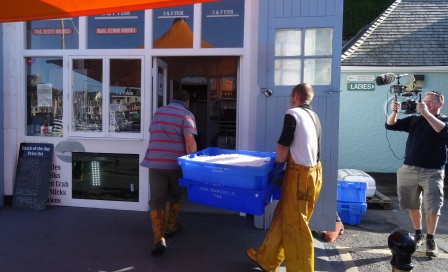 Paul & Tom delivering mixed fish to S&P fish shop
Paul & Tom delivering mixed fish to S&P fish shop
Through the rest of August and a balmy September, Sparkling
Star continued to target ray in the Bristol channel, landing in Ilfracombe,
with the bulk of their catch driven by Phil by lorry to Appledore Fish Dock and
processed by Bideford fisheries. The fishing was good – but the demand for ray
and hence the price remained low and for weeks on end they barely covered their
running costs, which meant the crew as Tom says on film were “earning nothing.”
Paul told me, “I held on in North Devon, for as long as I could. We’ve got to
get our ray back on the supermarket shelves.” I watched on Marine Traffic as
Sparkling Star left Ilfracombe, sailing round to Fowey and then Brixham to try
her luck in the English Channel.
And then in mid October came the news that ray fishing was banned in the Bristol channel because the UK as a whole had exceeded its quota. I asked Paul if he’d had any warning. The answer was no. “We thought we had quota left - we were so nearly there with the supermarkets promoting our ray.” Meanwhile Paul’s had to invest another £15,000 in new fishing gear – targeting cuttlefish and squid and try to find new processors to land to. Although he’s only in South Devon, the other side of the county, with the Olivia Belle (and some North Devon trawlers base themselves in the south over winter because there are more sheltered harbours)- it sounded a bit like they were refugees trying to find their way in a new country and that’s when he asked if I had a job for him.
When we were editing the film, Mark and I noticed how Paul would describe a new challenge facing the crew and then segue straight into a joke or quip. Unfortunately to tell our short story we had to lose most of the laughter. But occasionally it’s still there with ‘ice for your gin and tonic’ following probably the most important line for Paul ‘a good price for our ray would make a sustainable future for the North Devon fishermen.’ Despite the ups and downs in their year, echoed in our film, there’s no doubt Paul wants to stay fishing. “Given the choice” he said “100% I’d choose fishing.”
And then in mid October came the news that ray fishing was banned in the Bristol channel because the UK as a whole had exceeded its quota. I asked Paul if he’d had any warning. The answer was no. “We thought we had quota left - we were so nearly there with the supermarkets promoting our ray.” Meanwhile Paul’s had to invest another £15,000 in new fishing gear – targeting cuttlefish and squid and try to find new processors to land to. Although he’s only in South Devon, the other side of the county, with the Olivia Belle (and some North Devon trawlers base themselves in the south over winter because there are more sheltered harbours)- it sounded a bit like they were refugees trying to find their way in a new country and that’s when he asked if I had a job for him.
When we were editing the film, Mark and I noticed how Paul would describe a new challenge facing the crew and then segue straight into a joke or quip. Unfortunately to tell our short story we had to lose most of the laughter. But occasionally it’s still there with ‘ice for your gin and tonic’ following probably the most important line for Paul ‘a good price for our ray would make a sustainable future for the North Devon fishermen.’ Despite the ups and downs in their year, echoed in our film, there’s no doubt Paul wants to stay fishing. “Given the choice” he said “100% I’d choose fishing.”
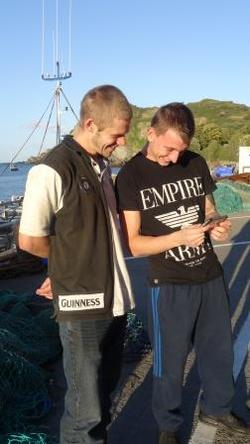 Tom & Logan watching their film!
Tom & Logan watching their film!
Huge
thanks to Paul, Tom and Logan for letting us briefly into their busy, working
lives, for being so patient with our questions, for trying to make it easy for
us and for looking after Mark, while he was on board. Thanks also to Phil who
appears only briefly in this film –but will feature in the blog I will write
‘following the squid trail.’ Big thanks
too to the lovely Clare Wharton who has done so well with S&P fish shop
this year, to Rich their fishmonger who knows his fish and was so helpful to
Boat Stories, to Tony Rutherford and the team at Bideford Fisheries and
everyone else who spoke to us. Thanks to Rowan Lincoln-Gordon for turning
around the music so quickly so we could get the film out ASAP. Finally big
thanks to Mark and his helpful team at Maniac Films, Stu Gaunt and Toby Gisborne.
THE KNOCK ON EFFECTS OF THE BAN on ray fishing in the Bristol Channel
While the larger boats can work out of different harbours, the smaller day boats are less adaptable. Boat Stories is making ten different films so will not pretend to be an expert on the North Devon fishery but during my research, I’ve spoken to many North Devon fishermen, fishmongers and processors and the knock on effects of the sudden ban on ray are huge. As our film suggests things were tough before the ban. But with no ray and the larger boats headed south, there’s not enough white fish landed to keep Bideford Fisheries going as a processor. Without a local processor the day boats struggle to find somewhere to land their fish and the fishmongers have nowhere local to buy prepared fish. Tony Rutherford from Bideford Fisheries told me last week, “I don’t know whether I’m coming or going.” Tony began trading in 1979 and in 2009 new warehouses and facilities for the fishermen were opened at Appledore Fish Dock at a cost of 3.7 million. Press headlines have stated that the Fishdock has closed and the North Devon fishing industry is no more. The business has moved into smaller premises and at least ten staff have lost their jobs. But as I write, frantic talks are underway to keep a small operation going that will, at least, allow white fish to be landed and keep the shellfish industry going.
Clare Wharton from S&P fish shop told me she would shut at the beginning of November and open again for Christmas. This year her husband Paul Wharton (the P from S&P fish shop) adapted his boat Boy’s Pride to fish for ray. Boat Stories saw the vessel when she first arrived in Ilfracombe and proudly took his family on a maiden voyage. As I write she’s tied up in harbour. Meanwhile Tats has invested in having a new boat built to fish the Bristol Channel.
Dan the Fishman told me that he will buy more fish from further afield and that he will diversify more into street cookery which is his passion. Paradoxically he told me that the day before he appeared in the local papers looking unusually glum, he’d had one of his best days ever at the North Devon food festival. Dave Gabe another fishmonger (and star of our river Torridge film) told me he would continue to buy fish from the small local boats. No one in the industry wants to put across the message that the North Devon fishery is closed and they’re hoping the ray quota will be reinstated in January if not before. Boat Stories is sure people like Paul and Dan will weather the latest storm, but others will be lost along the way. Meanwhile the North Devon Fisherman's Association will continue its campaign to have Bristol Channel Ray recognised as a sustainable fishery.
Jo 28/10/14
THE KNOCK ON EFFECTS OF THE BAN on ray fishing in the Bristol Channel
While the larger boats can work out of different harbours, the smaller day boats are less adaptable. Boat Stories is making ten different films so will not pretend to be an expert on the North Devon fishery but during my research, I’ve spoken to many North Devon fishermen, fishmongers and processors and the knock on effects of the sudden ban on ray are huge. As our film suggests things were tough before the ban. But with no ray and the larger boats headed south, there’s not enough white fish landed to keep Bideford Fisheries going as a processor. Without a local processor the day boats struggle to find somewhere to land their fish and the fishmongers have nowhere local to buy prepared fish. Tony Rutherford from Bideford Fisheries told me last week, “I don’t know whether I’m coming or going.” Tony began trading in 1979 and in 2009 new warehouses and facilities for the fishermen were opened at Appledore Fish Dock at a cost of 3.7 million. Press headlines have stated that the Fishdock has closed and the North Devon fishing industry is no more. The business has moved into smaller premises and at least ten staff have lost their jobs. But as I write, frantic talks are underway to keep a small operation going that will, at least, allow white fish to be landed and keep the shellfish industry going.
Clare Wharton from S&P fish shop told me she would shut at the beginning of November and open again for Christmas. This year her husband Paul Wharton (the P from S&P fish shop) adapted his boat Boy’s Pride to fish for ray. Boat Stories saw the vessel when she first arrived in Ilfracombe and proudly took his family on a maiden voyage. As I write she’s tied up in harbour. Meanwhile Tats has invested in having a new boat built to fish the Bristol Channel.
Dan the Fishman told me that he will buy more fish from further afield and that he will diversify more into street cookery which is his passion. Paradoxically he told me that the day before he appeared in the local papers looking unusually glum, he’d had one of his best days ever at the North Devon food festival. Dave Gabe another fishmonger (and star of our river Torridge film) told me he would continue to buy fish from the small local boats. No one in the industry wants to put across the message that the North Devon fishery is closed and they’re hoping the ray quota will be reinstated in January if not before. Boat Stories is sure people like Paul and Dan will weather the latest storm, but others will be lost along the way. Meanwhile the North Devon Fisherman's Association will continue its campaign to have Bristol Channel Ray recognised as a sustainable fishery.
Jo 28/10/14

